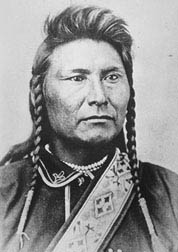
Joseph is one of the great figures of American history as both a political leader and a military leader.
His fame as a military leader came not from the fact that Joseph was a warrior but rather a great tactician who led a small band of Nez Perce to the border of Canada, with the goal of joining Sitting Bull who had found amnesty and protection in Canada.
In August of 1877 Joseph and his tribe had been ordered to surrender and move to the reservation. In the cover of night they escaped and headed north, first to meet up with members of the Crow nation and then, after being betrayed by the Crow, Joseph turned toward Canada seeking a land where Buffalo still roamed and where his people could live peacefully.
For 3 months Joseph and his small band evaded over 2,000 troops under the command of General Howard, who ultimately gained a grudging admiration for the Nez Perce leader. With 2,000 U.S. soldiers in pursuit, Joseph and other Nez Perce chiefs led 800 Nez Perce. The Nez Perce outmaneuvered and battled their pursuers traveling 1,600 miles (2,570 km) across Oregon, Washington, Idaho, Wyoming, and Montana. General Howard, leading the opposing cavalry, was impressed with the skill with which the Nez Perce fought, using advance and rear guards, skirmish lines, and field fortifications. Finally, after a devastating five-day battle during freezing weather conditions with no food or blankets, Chief Joseph formally surrendered to General Nelson Appleton Miles on October 5, 1877 in the Bear Paw Mountains of the Montana Territory, less than 40 miles (60 km) south of Canada in a place close to the present-day Chinook in Blaine County.
At the end of the Battle, Joseph and the Nez Perce camped - having announced their plans to surrender the following day. Joseph encouraged all those healthy enough to continue on to Canada to escape across the border during the night and he remained behind with the sick and wounded. When Joseph surrendered to General Howard the following day it is said that less than 1/2 of the surviving members of his band were with him and the rest had escaped to freedom in Canada.
The battle is remembered in popular history by the words attributed to Chief Joseph at the formal surrender:
"Tell General Howard I know his heart. What he told me before, I have it in my heart. I am tired of fighting. Our chiefs are killed; Looking Glass is dead, Too-hul-hul-sote is dead. The old men are all dead. It is the young men who say yes or no. He who led on the young men is dead. It is cold, and we have no blankets; the little children are freezing to death. My people, some of them, have run away to the hills, and have no blankets, no food. No one knows where they are—perhaps freezing to death. I want to have time to look for my children, and see how many of them I can find. Maybe I shall find them among the dead. Hear me, my chiefs! I am tired; my heart is sick and sad. From where the sun now stands, I will fight no more forever."It is said that his tactics are still taught today at West Point.
Biography of Joseph(Wikipedia)
Speeches of Joseph








